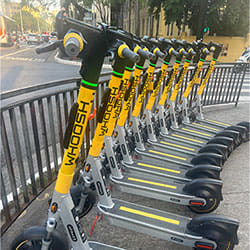
Let’s compare three differences between Portuguese spoken in Portugal and Portuguese spoken in Brazil. The first is vocabulary. For example, in Brazil, a mobile phone is called a “celular,” and in Portugal it is a “telemovel.” “Bus” is “ônibus” and in Portugal it's “autocarro.” “Ice cream” is “sorvete” but “gelado” in Portugal. The words are completely different. The second is pronunciation. While in Brazil vowels are pronounced clearly, in Portugal, they are often virtually not pronounced, depending on the vowel. Perhaps that's why they don’t seem to open their mouths wide and speak in an indistinct kind of way. “Esperança,” which means “hope,” is pronounced “esperansa” here, while in Portugal it is pronounced as if the vowel coming after the “p” is left out, like “esp’rança.” It’s the same for “pedaço,” which means “piece.” In Portugal it’s pronounced like “p’daço.” Third is grammar. The second person singular "you" is “você,” and “tu” is used only in very few regions, but in Portugal, “tu” is used for friends and “você” is the honorific form. It’s in Brazil where the object pronoun sometimes comes before the verb in a sentence. There are various other detailed differences, but I don't think there would be any problems studying either.

In 2005, 71,314 Brazilians lived in Portugal. Ten years later in 2015, that had increased to 162,190. When Brazilians look at going to another country to work or to seek a new life, their first choice is Portugal, where there is no language barrier. As well as that, over there they have the advantages of low unemployment, and a particularly good national insurance system. In 2009 there was a downturn in Portugal's economy, so some Brazilians came back home, but it seems that of all the European countries, Brazilians have less trouble living in Portugal. With that influence, it seems Portuguese people have become used to the Portuguese spoken by Brazilians and are able to understand it better.






























































